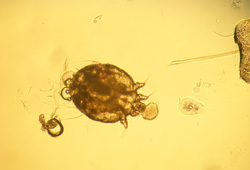Summary
Definition
History and exam
Key diagnostic factors
- infants, children, and older adults
- history of overcrowding
- history of itching in family members or close contacts over the same period
- generalized and intense pruritus, typically worse at night
- burrows
- papules, vesicles, excoriations
- positive ink burrow test
Other diagnostic factors
- papules on face, neck, palms, and soles in children
- immunosuppression
- bullae
- thick, crusted lesions occurring on elbows, knees, hands, and feet with dystrophic nails
- nodules
Risk factors
- overcrowded living conditions/poverty
- living in close quarters with others who are infected
- age under 15 or over 65 years
- sexual contact with new or multiple partners
- immunosuppression
- poor hygiene
- contact with an infected animal
- contact with contaminated clothing, towels, and bedding
- winter season
Diagnostic tests
1st tests to order
- ectoparasite prep
Tests to consider
- skin biopsy
Emerging tests
- epiluminescence light microscopy
Treatment algorithm
nonpregnant/nonlactating adults or children over 5 years
infants and children 2 months to 5 years and pregnant or lactating females
infants under 2 months
Contributors
Authors
Ryan Harris, MD
Dermatologist
Treasure Valley Dermatology and Skin Cancer Center
Boise
ID
Disclosures
RH declares that he has no competing interests.
Acknowledgements
Dr Ryan Harris would like to gratefully acknowledge Dr Pooja Khera and Dr Laura Korb Ferris, previous contributors to this topic.
Disclosures
PK and LKF declare that they have no competing interests.
Peer reviewers
David Cassarino, MD, PhD
Assistant Professor
Department of Pathology and Laboratory Medicine
University of California
Los Angeles
CA
Disclosures
DC declares that he has no competing interests.
Roderick J. Hay, DM, FRCP, FRCPath, FMedSci
Chairman
International Foundation of Dermatology
London
UK
Disclosures
RJH declares that he has no competing interests.
Peer reviewer acknowledgements
BMJ Best Practice topics are updated on a rolling basis in line with developments in evidence and guidance. The peer reviewers listed here have reviewed the content at least once during the history of the topic.
Disclosures
Peer reviewer affiliations and disclosures pertain to the time of the review.
References
Key articles
Chosidow O. Clinical practices. Scabies. N Engl J Med. 2006 Apr 20;354(16):1718-27. Abstract
Heukelbach J, Feldmeier H. Scabies. Lancet. 2006 May 27;367(9524):1767-74. Abstract
Hengge UR, Currie BJ, Jager G, et al. Scabies: a ubiquitous neglected skin disease. Lancet Infect Dis. 2006 Dec;6(12):769-79. Abstract
Strong M, Johnstone PW. Interventions for treating scabies. Cochrane Database Syst Rev. 2007 Jul 18;(3):CD000320.Full text Abstract
Rosumeck S, Nast A, Dressler C. Ivermectin and permethrin for treating scabies. Cochrane Database Syst Rev. 2018 Apr 2;(4):CD012994.Full text Abstract
Johnstone P, Strong M. Scabies. Clin Evid. 2006 Jun;(15):2284-90. Abstract
Reference articles
A full list of sources referenced in this topic is available to users with access to all of BMJ Best Practice.

Differentials
- Impetigo
- Xerotic dermatitis
- Folliculitis
More DifferentialsGuidelines
- Sexually transmitted infections treatment guidelines, 2021: ectoparasitic infections
- European guideline for the management of scabies
More GuidelinesPatient information
Scabies
More Patient informationLog in or subscribe to access all of BMJ Best Practice
Use of this content is subject to our disclaimer